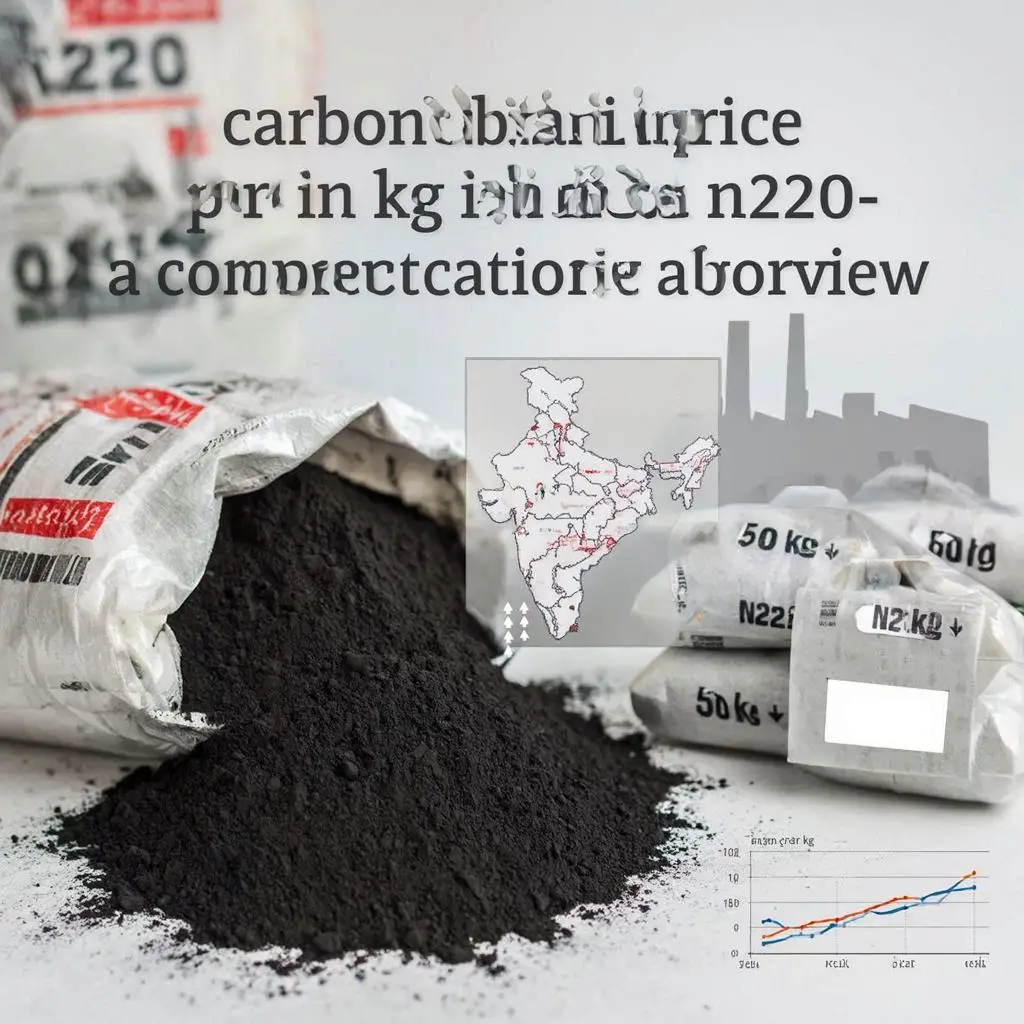
Carbon Black Price Per Kg in India N220- A comprehensive overview
Explore the latest updates on carbon black price per kg in India, including a specific focus on the N220 grade. Discover the important role it plays in industrial processes, pigment manufacturing, and overall market movement.
Introduction
This section introduces carbon black and its relevance in pricing trends across India.
A fine, jet-black powder, carbon black is primarily elemental carbon obtained through the partial combustion process of petroleum-based heavy oils. It plays a crucial role in the pigment and rubber industries, offering deep coloration and reinforcement. As one of the key ingredients in tires, inks, plastics, and coatings, carbon black's market demand is tightly linked to the manufacturing and automotive sectors.
In particular, the carbon black N220 grade is known for its high structure and durability, making it a preferred choice in high-performance rubber products. Understanding the carbon black price per kg in India, especially for N220, is essential for businesses involved in rubber processing, plastic manufacturing, and pigment production. This article breaks down general pricing, India-specific trends, and the implications of the N220 grade.
Carbon Black Price Per Kg
A detailed look at the general price trends of carbon black per kilogram globally and by grade.
The carbon black price per kg varies depending on multiple factors, including grade, purity, source, and intended application. On average, standard industrial-grade carbon black typically ranges between ₹70 to ₹130 per kg, though premium pigment or reinforcing grades can go higher. Prices may also fluctuate based on oil price volatility, feedstock availability, environmental compliance costs, and global demand.
The pigment industry is particularly sensitive to these fluctuations. Carbon black used in inks and paints must meet stringent quality controls, thereby driving prices up. Additionally, transportation costs, import duties (for imported variants), and regulatory levies influence the final cost per kilogram in different regions.
Another key factor impacting pricing is the carbon black structure. High-structure blacks like N220 or N330 fetch higher prices than low-structure blacks used in non-critical applications. As sustainability demands rise, low-emission or sustainable production carbon blacks are also entering the market at premium rates.
Carbon Black Price Per Kg in India
Explore India’s local market pricing for carbon black and its economic implications.
In India, the carbon black price per kg generally falls within the range of ₹85 to ₹150, depending on the supplier, region, and carbon black grade. Indian manufacturers such as Phillips Carbon Black Limited (PCBL), Himadri Speciality Chemical Ltd., and Birla Carbon dominate the domestic market and influence national pricing structures.
Due to India's growing automotive and manufacturing industries, local demand remains strong. Carbon black used in tire production — especially reinforced grades — maintains high volumes and competitive pricing. Pigment-grade carbon blacks used in inks and paints, although smaller in volume, command a higher price due to purity requirements.
India also imports specialized grades from global suppliers in the US, Germany, and South Korea, especially for use in high-end industrial coatings, conductive applications, and masterbatches. Import prices can be 15-25% higher than domestic equivalents due to freight, taxes, and currency fluctuations.
The Indian government's "Make in India" initiative has promoted localized production, helping stabilize prices while increasing quality output. Nonetheless, raw material cost inflation and environmental regulations remain key determinants of price variability.
Carbon Black N220 Price Per Kg
Focused insight into the N220 grade and its current market price per kg in India.
The carbon black N220 price per kg in India ranges from ₹110 to ₹160, depending on the manufacturer and purchase volume. N220 is a high-performance reinforcing carbon black known for its high modulus and abrasion resistance, making it ideal for truck tires, industrial belts, and vibration-dampening rubber products.
The ASTM carbon black classification places N220 between N110 and N330, as it features a moderate surface area and a higher structural configuration. This balance gives it excellent resilience and elongation properties, allowing its use in components that experience repeated stress.
In pigment applications, although N220 is less common than specialty grades like FW200 or Monarch 880, it can still be used in certain coatings or plastic coloring where reinforcement and pigmentation are needed simultaneously. Manufacturers producing pressure pipes, conveyor belts, and engineered plastics value N220’s ability to enhance both mechanical strength and UV stability.
Suppliers often quote bulk prices for N220 in metric tonnes, but retail prices per kilogram may increase due to packaging, logistics, and value-added services like pre-dispersion or pelletizing. Environmental compliance also contributes to pricing, with eco-friendlier N220 grades costing slightly more.
Conclusion
Final insights on carbon black pricing and its relevance to Indian industries and pigment applications.
Carbon black remains a cornerstone in India’s industrial and pigment sectors, with pricing closely tied to oil markets, production methods, and domestic demand. The carbon black price per kg offers critical insights for businesses involved in automotive manufacturing, industrial rubber products, plastics, and pigment applications.
As India continues to invest in infrastructure and broaden its export horizons, the demand for carbon black surges—especially for high-performance grades like N220. Even with a broad spectrum of per-kilogram prices across uses, N220 earns recognition for its durable and reliable characteristics.
As environmental and sustainability considerations gain prominence, companies will likely see price adjustments aligned with low-emission manufacturing and greener pigment alternatives. For now, staying updated with current carbon black prices per kg, especially for critical grades like N220, is essential for cost planning and product optimization across sectors.

